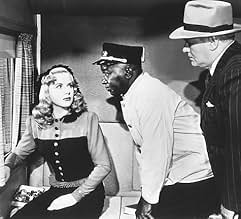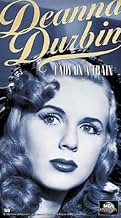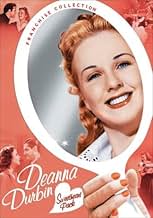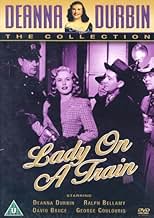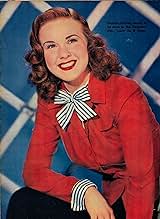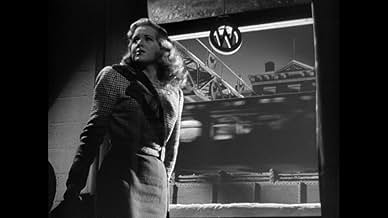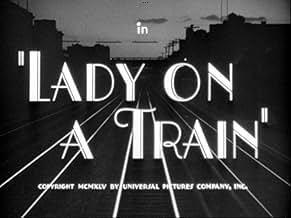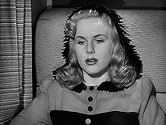IMDb-BEWERTUNG
6,7/10
2741
IHRE BEWERTUNG
Füge eine Handlung in deiner Sprache hinzuIn New York, a woman who partially witnesses a killing from a train window seeks the aid of a crime novelist to solve the murder.In New York, a woman who partially witnesses a killing from a train window seeks the aid of a crime novelist to solve the murder.In New York, a woman who partially witnesses a killing from a train window seeks the aid of a crime novelist to solve the murder.
- Regie
- Drehbuch
- Hauptbesetzung
- Für 1 Oscar nominiert
- 1 Nominierung insgesamt
Jacqueline deWit
- Miss Fletcher
- (as Jacqueline de Wit)
Jane Adams
- Circus Club Photographer
- (Nicht genannt)
Fred Aldrich
- Cop in Lock-up
- (Nicht genannt)
Ernest Anderson
- Train Porter
- (Nicht genannt)
Carl Andre
- Man at Newsreel Theatre
- (Nicht genannt)
Bobby Barber
- Man at Newsreel Theatre
- (Nicht genannt)
Empfohlene Bewertungen
Deanna Durbin finally got a chance to get out of her giddy teen-age roles and into a giddy adult role for a nice change of pace! She's made up to look sophisticated as she emotes in a screwball comedy-mystery about a girl who witnesses a murder from her train window and then sets out to find the corpse and the killer with the help of a mystery writer (David Bruce). The cast is studded with oddballs: Edward Everett Horton, Dan Duryea, Elizabeth Patterson, George Coulouris, Jacqueline DeWitt, Ralph Bellamy, William Frawley. All of it is highly unlikely but reality is not what this amusing mystery spoof is about. Deanna Durbin not only manages to bring comic flair and poise to her inquisitive young lady--she does a nifty job on some torchy night-club numbers: Night and Day and Give Me A Little Kiss, as well as Silent Night for a Christmas scene. Enjoyable as long as you're not expecting true-to-life situations! The wacky plot seems like something Agatha Christie might have spun in one of her wilder moments.
This was the first Deanna Durbin film I've seen, and while it's much different than her other films, it seems a great place to start! The first thing that struck me was how likable Ms. Durbin is in the lead role. She keeps the tone light and airy, and the film flies along at a joyous speed! The photography is amazing (the snowy Manhattan sets and Ms. Durbin's close-ups are wonderful!) Deanna's vocals on "Night and Day" hint at a sensuality that wasn't present in her other pictures, and her rendition of "Silent Night" is divine.
I won't summarize the plot, as it has been done in other comments, just suffice to say that this hilarious whodunit is perfect viewing while curled up with a hot drink on a snowy winter evening!
I won't summarize the plot, as it has been done in other comments, just suffice to say that this hilarious whodunit is perfect viewing while curled up with a hot drink on a snowy winter evening!
Deanna Durbin was truly a Hollywood phenomenon. Never comfortable as a film star, she exuded just enough conflicting emotion to make her screen persona fascinating.
In film after film, regardless of the part or situation, Durbin was never entirely at home before the camera or in her roles. True, she put up a great front, and by her mid teens was the highest paid female in the world.
Audiences loved her, supported her films, bought Durbin dolls, and reveled in her fan clubs. But Durbin herself apparently couldn't have cared less.
"Lady on a Train" is a case in point: her fifth to final film made at age 24 just 3 years before she retired at age 27, is a quirky hybrid of murder mystery, musical, and comedy. It gives Deanna a chance to flex her adult acting chops, while offering ample opportunities to warble vocal selections.
Durbin's dichotomy of between being on camera while wishing she were somewhere else is what provides her personality intrigue. Despite her infectious smile and gorgeous natural voice, Durbin's persona was negative.
What saved her was that she was a very good actress, and in fact became the saving grace of Universal Studios. Finally finding salvation in marriage to her "Lady on a Train" director, she kissed everything goodbye and left filmdom at the peak of her powers.
I'm sure she found what she was looking for in that quaint Parisian suburb, and that she may have significantly extended her longevity in the process. In the meantime, she left her public with some very pleasant films to enjoy.
In film after film, regardless of the part or situation, Durbin was never entirely at home before the camera or in her roles. True, she put up a great front, and by her mid teens was the highest paid female in the world.
Audiences loved her, supported her films, bought Durbin dolls, and reveled in her fan clubs. But Durbin herself apparently couldn't have cared less.
"Lady on a Train" is a case in point: her fifth to final film made at age 24 just 3 years before she retired at age 27, is a quirky hybrid of murder mystery, musical, and comedy. It gives Deanna a chance to flex her adult acting chops, while offering ample opportunities to warble vocal selections.
Durbin's dichotomy of between being on camera while wishing she were somewhere else is what provides her personality intrigue. Despite her infectious smile and gorgeous natural voice, Durbin's persona was negative.
What saved her was that she was a very good actress, and in fact became the saving grace of Universal Studios. Finally finding salvation in marriage to her "Lady on a Train" director, she kissed everything goodbye and left filmdom at the peak of her powers.
I'm sure she found what she was looking for in that quaint Parisian suburb, and that she may have significantly extended her longevity in the process. In the meantime, she left her public with some very pleasant films to enjoy.
The 1930s and 40s had some lovely actresses. But few of them could compare to the dazzling Deanna Durbin. With her sparkling eyes, her wholesome smile, her beautifully blonde hair, and her charming personality, Durbin outshines everyone else in this film by far, and lifts a drab story to the level of enjoyment. She plays Nikki Collins, a smart young woman, the "Lady", in Charles David's "Lady On A Train", who, from her train compartment, witnesses an unlikely murder in a nearby building.
Technically, the film is a whodunit. But, from the beginning, viewers understand that the story is a spoof, not to be taken seriously. Playing amateur detective, Nikki races around amid various characters and comic situations, attempting to find the killer. But she's just too lucky and too clever for the plot to be considered credible.
The setting is New York City on Christmas Eve, with snow falling. As a result, the film has a soft, soothing feel to it, despite the criminal component. The film's humor is what I would describe as old-style. For example, one sequence has Nikki trying to get the attention of a mystery writer, while the writer and his girlfriend sit in a crowded theater. Nikki moves in and out of rows, disrupting the audience, with predictable humorous consequences.
In the film, Durbin sings a couple of songs, and thereby interrupts the film's flow. But, in one case, the interruption is justified, as it becomes, for me, the highlight of the entire film. Into a telephone, she sings two full verses of "Silent Night". With her magically radiant face and her beautiful singing voice, she exalts the already beautiful Christmas carol to resplendent melodic purity. This sequence is almost hypnotic in its simple beauty, and alone redeems the film from its many flaws.
Usually, I don't care for films that exist seemingly just to advance the career of the film's star. However, "Lady On A Train" is an exception. The story is not very interesting, the gags are tiresome, and the acting is average. But, through sheer force of her charming personality, Deanna Durbin alone makes this film worth watching.
Technically, the film is a whodunit. But, from the beginning, viewers understand that the story is a spoof, not to be taken seriously. Playing amateur detective, Nikki races around amid various characters and comic situations, attempting to find the killer. But she's just too lucky and too clever for the plot to be considered credible.
The setting is New York City on Christmas Eve, with snow falling. As a result, the film has a soft, soothing feel to it, despite the criminal component. The film's humor is what I would describe as old-style. For example, one sequence has Nikki trying to get the attention of a mystery writer, while the writer and his girlfriend sit in a crowded theater. Nikki moves in and out of rows, disrupting the audience, with predictable humorous consequences.
In the film, Durbin sings a couple of songs, and thereby interrupts the film's flow. But, in one case, the interruption is justified, as it becomes, for me, the highlight of the entire film. Into a telephone, she sings two full verses of "Silent Night". With her magically radiant face and her beautiful singing voice, she exalts the already beautiful Christmas carol to resplendent melodic purity. This sequence is almost hypnotic in its simple beauty, and alone redeems the film from its many flaws.
Usually, I don't care for films that exist seemingly just to advance the career of the film's star. However, "Lady On A Train" is an exception. The story is not very interesting, the gags are tiresome, and the acting is average. But, through sheer force of her charming personality, Deanna Durbin alone makes this film worth watching.
...that turns briefly into a noir thriller near the end, and takes place almost entirely on Christmas Eve. Of course the plot is manipulated to make time for a couple of songs, including Cole Porter's "Night and Day," when she has to pretend she's a night club singer during her investigation.
The film begins while her train is pulling into New York, and during a brief pause before continuing to Grand Central Station it pauses long enough for her to see a murder being committed in a warehouse window across the tracks. Naturally since she's been reading a murder mystery, so nobody believes she saw a real murder, so she tries to enlist the author of her book to help her solve the crime. Somehow she stumbles into the reading of the will for the dead man and is mistaken for his nightclub mistress, who is the sole heir. It's too bad Durbin did not continue her career, as she does a great job playing an adult role with a winning blend of comedy, drama, romance and still a bit of music.
The film begins while her train is pulling into New York, and during a brief pause before continuing to Grand Central Station it pauses long enough for her to see a murder being committed in a warehouse window across the tracks. Naturally since she's been reading a murder mystery, so nobody believes she saw a real murder, so she tries to enlist the author of her book to help her solve the crime. Somehow she stumbles into the reading of the will for the dead man and is mistaken for his nightclub mistress, who is the sole heir. It's too bad Durbin did not continue her career, as she does a great job playing an adult role with a winning blend of comedy, drama, romance and still a bit of music.
Wusstest du schon
- WissenswertesDeanna Durbin and director Charles David were wed in 1950 and retired to a life in rural France. They remained married until his death in 1999.
- PatzerWhen Mr. Haskell leaves Grand Central Station with Nikki Collins, they call for a taxi. When a taxi pulls up, however, Nikki's luggage is already piled in the front seat though she did not walk out with any bags nor did a porter load any luggage into the taxi. The taxi wasn't there waiting for them; it was just a random taxi that happened to pull up. The sequence, therefore, doesn't make any sense, and it interrupts the flow of the story.
- Zitate
Nikki Collins: I just saw a murder.
- VerbindungenEdited into Christmas Hymns (1954)
- SoundtracksSilent Night
Original lyrics by Joseph Mohr (uncredited)
Melody by Franz Xaver Gruber (uncredited)
English translation by John Freeman Young (uncredited)
Top-Auswahl
Melde dich zum Bewerten an und greife auf die Watchlist für personalisierte Empfehlungen zu.
Details
- Erscheinungsdatum
- Herkunftsland
- Sprache
- Auch bekannt als
- Lady on a Train
- Drehorte
- Produktionsfirma
- Weitere beteiligte Unternehmen bei IMDbPro anzeigen
Box Office
- Weltweiter Bruttoertrag
- 34 $
- Laufzeit1 Stunde 34 Minuten
- Farbe
- Seitenverhältnis
- 1.37 : 1
Zu dieser Seite beitragen
Bearbeitung vorschlagen oder fehlenden Inhalt hinzufügen

Oberste Lücke
By what name was Die Dame im Zug (1945) officially released in India in English?
Antwort

